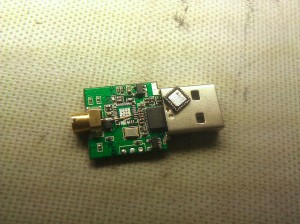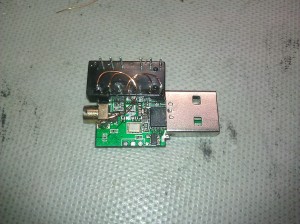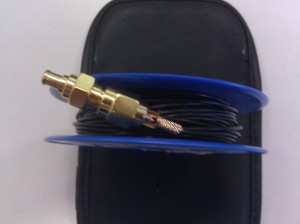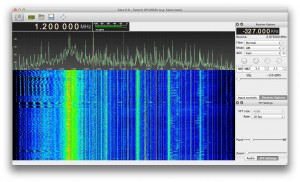Some time ago I’ve tried the HF Mod (aka Direct Sampling Mod) on one of my dongles. The simplest way of doing it is by connecting one of the RTL2832U’s ADC (pin 1 or 2) inputs to an antenna which is exactly how I started. Shortly after that mikikg told me about using a transformer in order to generate a differential signal for the ADCs differential input, as well as boosting the signal and matching impedance. As a quick and dirty solution I desoldered a H16105DF 10/100Mbps Ethernet decoupling transformer from an old ADSL modem and used it. It actually matches the frequencies we care about quite well and in addition serves as a low pass filter. At the moment it is used in a 1:1 configuration, though 1:2 will probably perform better, thus I plan to try that as well. Using it together with an antenna made from a few meters of litz I receive many AM radio stations as well as lots of other signals.
Update:
Since someone over at reddit claimed that mikikg originally came up with using Ethernet transformers for the mod, implying I wouldn’t credit him properly, I feel like clarifying. On 10/3/12 I sent him a mail explaining that I had tried a variation of the HF-Mod using an Ethernet transformer and that the results were promising, I also attached a picture to that mail. Seemingly we then both blogged about it quite a while later, yet he did so before I did.
Update #2:
I have tried using the transformer in a 1:2 configuration and the signal actually got worse. That makes me wonder about the RTL2832U’s input impedance.




I tried this mod last night after wrapping my own balun. Tried to solder it in place and I toasted 2 dongles, lol. I bumped the wires to the I- & I+ and ripped off the traces. I did manage to get some HF receive tho, with one partially salvaged dongle bridging the I+ to the antenna center pole. I strung up some split twin lead 25feet in the house and received some faint 3.6MHz LSB. I used your OSX port of gqrx with device string direct_samp=1, not sure if the device string is needed for your port.
I didn’t feel confident enough to wrap my own one, I think picking the right core is also quite relevant for the resulting frequency response. Sad to hear about the dead dongles, I guess we can be glad those things are that cheap. The direct_samp=1 is only needed if you leave the e4000 tuner in place, as you can see my dongle doesn’t have it anymore, thus it always switches into direct sampling mode.
“The direct_samp=1 is only needed if you leave the e4000 tuner in place”
a’ha! Thank you! – My good Santa is bringing a Aoyue 968A+ rework station, soon I will pull the E4000 and the R820T in the $10 RTL2832U dongles. Air + solder paste should also make for easier connection to the I+- pins directly (on the 2 dongles with 1 lifted trace). I’m thinking of adding a pin header for the Balun on one of the dongles to allow for quick re-wrappings/experimenting. I also have a 3rd un-modded dongle to play with, not that I really need these things, I also have the SoftRock Ensemble II Receiver (1.7MHz to 3MHz), it just fun to see what can be pulled in with a $10 – $20 dongle.
I also picked up some Mica Caps, BNC connectors and a metal box to build this ‘Simple’ Low Pass Filter to remove the FM broadcast intermod. http://www.dxzone.com/cgi-bin/dir/jump2.cgi?ID=12590
Pingback: RTL-SDR transformer mod | GeoSDR | Scoop.it
Hello,
I was wondering which pins you used on your H16105DF. I cant see which way you have the chip oriented and I plan to duplicate your work using a FC-638LS which has nearly identical specs and the same schematics as the transformer you utilized. I’m not even sure if it matters which pins I use but I thought I would ask since it seems to me that you know a lot more about these transformers then I do.
Thanks,
Eric
Pins 10 and 11 are connected to antenna and ground, while 15 and 16 connect to the ADC. Though turning it around shouldn’t matter, it only affects the common mode choke which isn’t really needed to begin with.